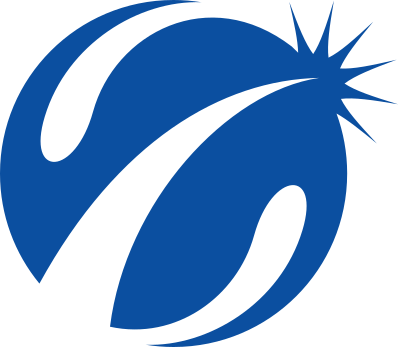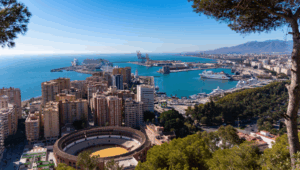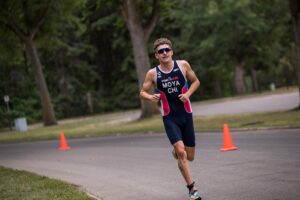Macca – as he sees it

The McCormack family recently had an addition and Macca talked to slowtwitch about family, health, racing, Kona, qualifying for the Olympics and his new book "I'm here to win." He even put up a challenge for slowtwitch readers.
Slowtwitch: You have been a busy man, and the big news for you is an addition to the family. Are you working on a clan?
Macca: It is so exciting for us as a family. Baby Flynn was born on 5th of May 2011, and everything went amazing and fine. My girls Tahlia and Sienna are absolutely besotted with him. He is going to be one spoilt boy that’s for sure. We are a growing family, but my wife Emma has made it very clear, that the 5 of us is a perfect number and not to plan on 6. Flynn is the first boy in the McCormack family. My elder brother has two girls of his own along with my two girls. It is nice to finally have a boy. My father is obviously very chuffed, as is dad!
ST: You have also been dealing with an injury, how is that coming along?
Macca: I guess it is called older age! Just joking. I pulled up a little lame after a track session that really aggravated a calf muscle in February. On the decision to get fast and go back to ITU racing I got a little ahead of myself and wanted to see where I was at, speed wise, after 9 years out of this style of racing. I hit the track and hit out some intervals to give me a training measure and finished with some max effort sets. I had not done this style of workout in years and pulled up a little sore. Some older scar tissue on my calf flared up and I was sidelined from running for a while. It was a good lesson to learn. It has been 10 years since I did this style of work and I am not in my 20’s anymore so the training needs to be more refined and delicate. I was definitely over excited to get back into the sharper work and set my training plan around some real speed numbers and a snap shot of exactly what I had ahead of me. The body was just not ready for this style of work and made it very clear to me post this session.
We have come out the other end of it very good, and the calf is much better. We are very aware of just how difficult this transition to speed will be for an athlete who has been racing Ironman for so long. It is a fine process. I guess the good thing about my team is we don’t panic. We had an issue, we got it sorted, and we adjusted things so as to ensure that we are aware of this fragility in my muscles. It is definitely a point of weakness for me in this style of work, and we are working hard to make sure it is not an issue again. It has been a long time since I have been up on my toes running.
ST: We have heard about you wanting to qualify for the Aussie Olympics team. Is that goal still in place?
Macca: Goal is still in place for sure. It is an absolutely enormous task with the depth of talent in Australia, but it is well worth chasing that’s for sure. ITU racing is fast a furious and I guess as you age you lose some of that ability. But it is also a game of smarts and I think I have a lot of them. More than anything I just think it is a great opportunity to race the next generation of triathletes. I have continued to follow the ITU racing my entire career and am not one of those athletes who have ever felt the need to justify what is harder, ITU racing or Ironman racing. I have been very successful at both styles of racing and both styles demand so many different strengths and weaknesses that they are super difficult in their own right. I have always been motivated by (sometimes criticized to be honest) for wanting to race people and test myself against others. It is what motivates me to continue racing and was the entire reason I got into triathlon in the first place. I love racing.

These young guys are going to kick my butt that’s for sure, but more than anything I want to try and take as many of them out as possible. Making the Olympic Team would be awesome at this age, but it is no easy task that’s for sure! At 38 years of age it will be the last time in my life that I will ever get the opportunity to race for a spot on an Olympic team. It is this very fact that motivates me, and is exciting. I turned my back on this style of racing to chase Ironman dreams. I achieved those, why not return and try and have a go. At the end of the day if I don’t make it, I am in the same position I am now, but if I do, how exciting! It’s a win, win!
ST: Which ITU events are on your calendar right now?
Macca: I was planning on racing in Japan but that event got cancelled after the terrible earthquake and Tsunami. I was hoping to cut my teeth early in the year, get a feel and make adjustments to my workload to attack a later season of shorter races.
So my first event will now be in Kitzbuhel. It is not the best preparation as I will have been two weeks post an Ironman race (I was contractually obligated to this event prior to my decision to chase ITU events) and then will be racing the series as I can make them. I have locked in all the late season World cup events and will go for it. The difficulty will be nursing my way back to speed. The transition in the sport in this direction is extremely difficult and we are aware of this. These are the fastest triathletes on earth and the draft legal style of racing changes the entire dynamics of strength versus speed that is the non drafting style of racing that I have been doing for the past 9 years. I am enjoying the build and the adjustment but the process needs to be slow and careful.
I know I can do it. I just have to be more delicate now and not rush it. Have I given myself enough time? That is the magic question. By London time I think I could be at very peak racing speed and strength, but I need to make the Team by then. We will push the envelope but be very wary of the demands on my body and this adjustment. Remaining injury free is my main focus. An injury will kill the entire thing and at this stage in your career can be career threatening. So we are focused on this and not rushing things at all!
ST: Does that mean for sure that Kona is out for you?
Macca: I love Kona! You never say never. For 2011 I will say that Kona is a no go, but I think I still have a lot more to give in Kona. Actually to be honest with you, I think I have more chances of winning Kona again than I do of making the Australian Olympic Team, but this being said, like anyone I am motivated by challenge which is why I am walking down this path. Ironman racing in Kona is an art form for bigger athletes and I enjoy this process very much. I will be in Kona in 2011, but it will be nice to be there in another capacity. Mark Allen took a year of in 1994. He sat back, observed and made some changes. We all know what happened in 1995.

ST: Or are you playing with minds of your competitors?
Macca: No mind games at all. I promise. I never play mind games ☺
ST: Talking about competitors, it seems you made Wildflower winner Jesse Thomas very happy with your nice shout out.
Macca: I know how enormous this event is. It is such a great title to have in your resume and as far as I am concerned it is the most important Half Ironman race to own. Prior to this new series of Ironman 70.3 racing, Wildflower was the unofficial World Championships of Half Ironman. It was the event that mattered and has such a rich history on a fair and honest course. It is great to see young guys come out and win this event. It is a good stepping stone for a them and such a marque title to win. It is a resume race. Jesse should be very proud of this title and treasure it. It is truly in my opinion one of the sports crown jewels. Not many races have a history like Wildflower! I have followed this race for 20 years so it was great to see the title go to a young guy who is having a go and chasing his dream of racing professionally. He had an outstanding run on a tough course. I was happy for him.
ST: Your book is coming out later this month, and apparently it is already quite popular.
Macca: The book will launch globally on May 23, but for those that pre order on Amazon I have been told they get the book prior to the stores. The book is called “I'm here to Win” and it was an interesting thing to do. It always feels quite funny when you are writing about yourself and your experiences in the sport. It only feels like yesterday some of the stories we talk about. I had great people working with me in Tim Vandehay my ghostwriter, who was awesome at pulling a lot of the stories out of me and making me think about why I do and say what I do. When the publishers gave me a basic outline of what they were looking for in my book, my only request to them was, I wanted to make sure it was brutally honest. I was going to have my say on many issues and things that happen behind the scenes that many people don’t know about. We touched on a lot of my career but also a lot on the guys I raced around the World, the events and the experiences I have had in the past 16 years racing. It was an interesting experience that’s for sure! It has been very popular I have been told. It would be great to have a New York Best Seller. That would be awesome for triathlon and for me also. You can get everyone on slowtwitch to buy the book today and we would pull that off easily. So if I don’t become a New York Best Seller I am blaming you Herbert.
ST: We’ll work on that Macca, but was the writing experience such where you’d want to do another one maybe not now but sometime in the future?
Macca: The entire publishing experience was incredible. It is amazing how many Triathletes and Endurance junkies sit in some of the Worlds biggest publishing houses in New York City. Our sport attracts so many amazing people. Many of these people helped me map what they thought people would want to know. My publisher Hachette was amazing with this and the entire team has some of the most positive and motivated people I have ever been involved with. They knew who I was, wanted to know more about certain things of my personality and why I went about my sport the way I did, and thought it would be great to really focus on this aspect of my life, intertwined with my life (I hope that makes sense) I thoroughly enjoyed the process and have a greater understanding now of the complexities of publishing. I would love to do a more dynamic book in the future that was more for others as opposed to just my story.

This book has a lot for people to take away, but a very focused and refined book on training and planning would be something I would enjoy doing. I think many of the triathlon books out there are dated or to be honest are not triathlon specific enough for the times. I know this because we went through a lot of them prior to writing my book. This sport has moved forward so quickly in the past 20 years. Understanding how to get the best out of yourself in triathlon for every individual is interesting. I would love to write something along these lines, with our training systems and what we have evolved and adapted over the past 20 years in the sport. I guess for many of the publishing houses my book now is a toe in the water for triathlon as a sport. We put our team in contact with Chrissie Wellington and she is the next to write a book, so triathlon is on the map now. We just need to show that as a sport it can stand alone. Buying the book will open up these doors very much like Lance’s book did with cycling!
ST: We know you to be fairly outspoken and we really appreciate that. But that brings the question up, what would we find in the book that we might not have heard from you before?
Macca: In the past I think people have always drawn conclusions on me through popular opinion or through media perception of what I stand for and who I am. I have seriously always been really confused as to why people have always called me outspoken. I just state things as I see them and to be honest with you, I have always just been honest. What you see is what you get with me. I don’t have my behind the scenes persona and then my in-front of the media persona, and I know many of the athletes in our sport do have this. I see that as so fake!
I think for this reason the book will give you an insight into what makes me tick, and why we do what we do. I feel it is only at these later stages of my career are people starting to appreciate that I am pretty smart when it comes to racing savvy and breaking down an event, the athletes and finding weaknesses in the fields and then going about exploiting them for my benefit. All the criticism I got in Ironman I got back in the day racing World cups when I called Simon Lessing out and said I thought I could beat him. It wasn’t until I did it in exactly the way we said we would, that people started to think that Simon had a weakness and went after attacking him in the first part of the run. I ran away with the World title by attacking the run out of transition. I have always felt that Triathlon is built off popular opinion and so many people never question anything. They just accept that what is, IS, and work their training and mindset around this. Athletes come along who change the game and the sport moves forward. Simon Whitfield did it in ITU Racing, as did Peter Robertson to some degree. In Ironman Norman Stadler came along and threw a big spanner in the works and the depth of the sport grew in the sense that the basic fundamentals needed to be addressed with much more focus. We touch on this a lot in the book, and how we go about finding these weaknesses, and then planning to exploit them for our benefit.
Some of the stuff in the book is very simple as we had to target a market that is new to triathlon and doesn’t understand the different forms of racings, so for people who know this stuff this might be a little trivial, but overall you will get a lot out of this. I don’t hold anything back and am proud of that fact.
ST: Is there anything else we should know about you?
Macca: Ummm I drink way too much coffee.






